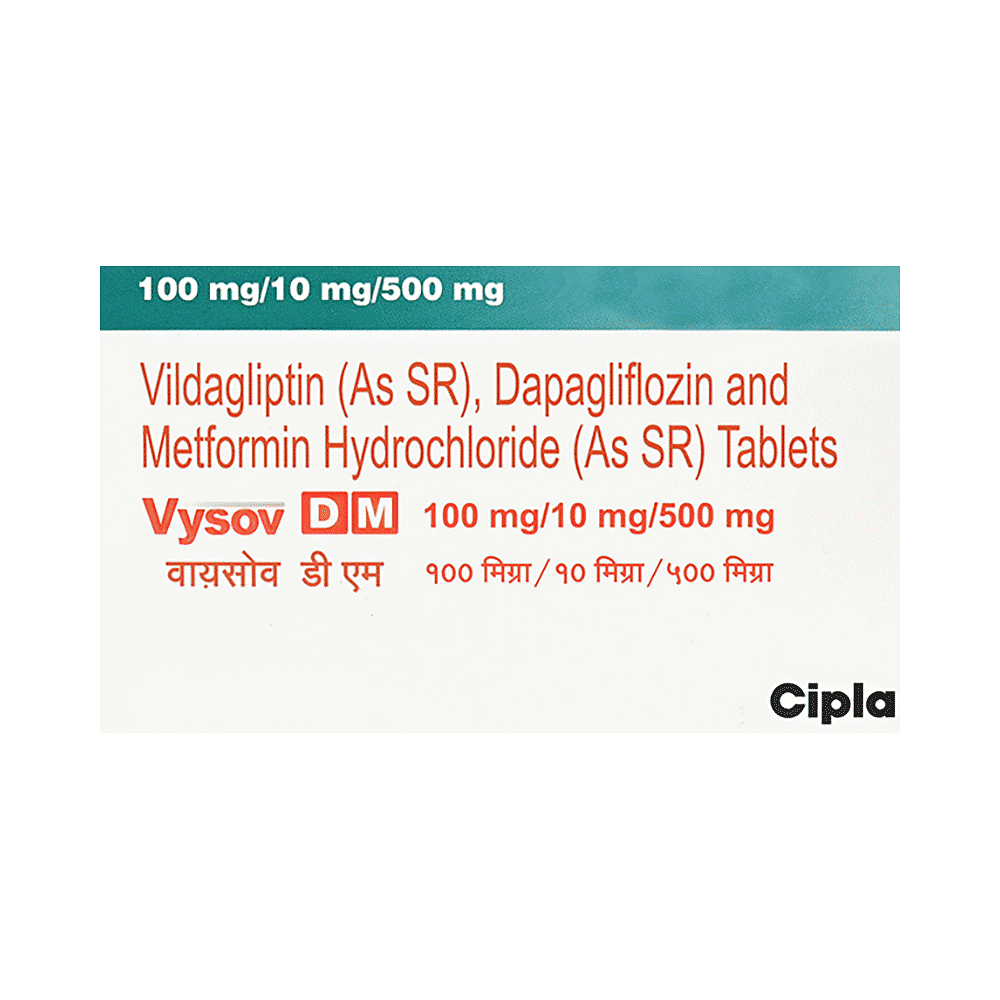
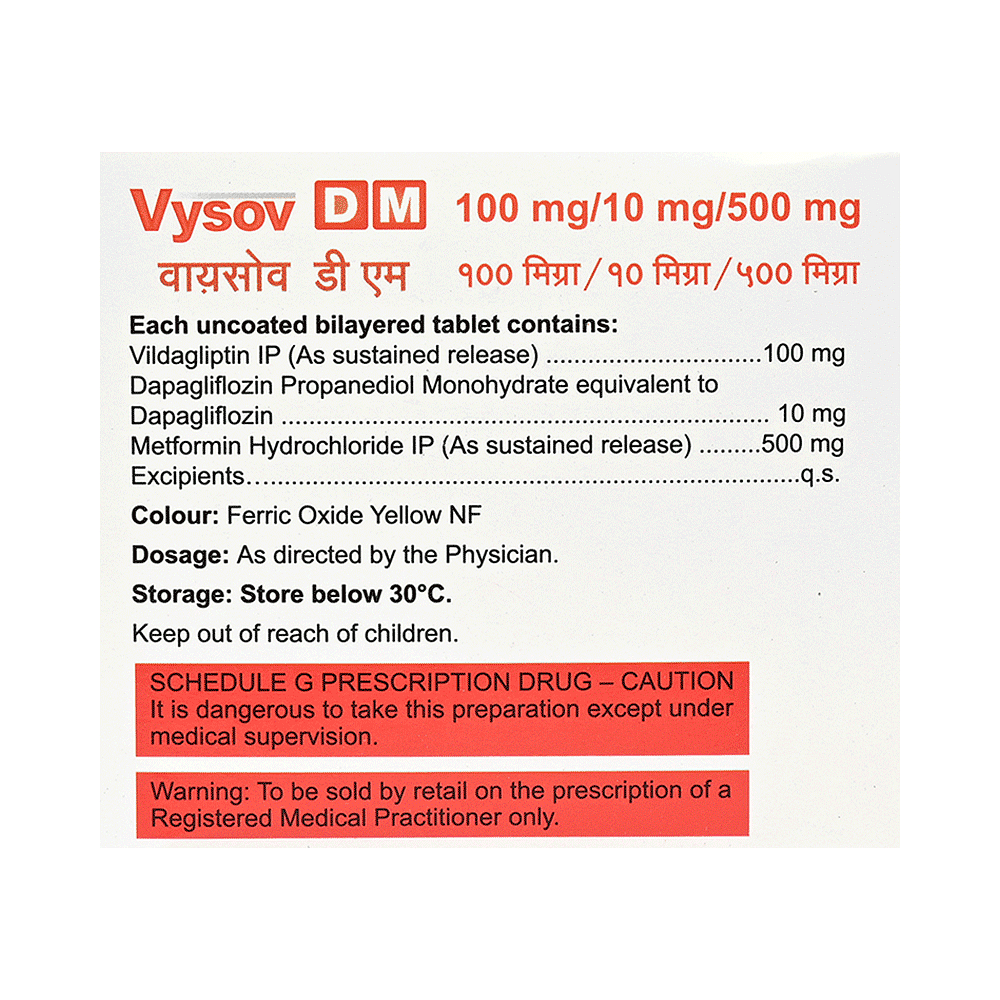
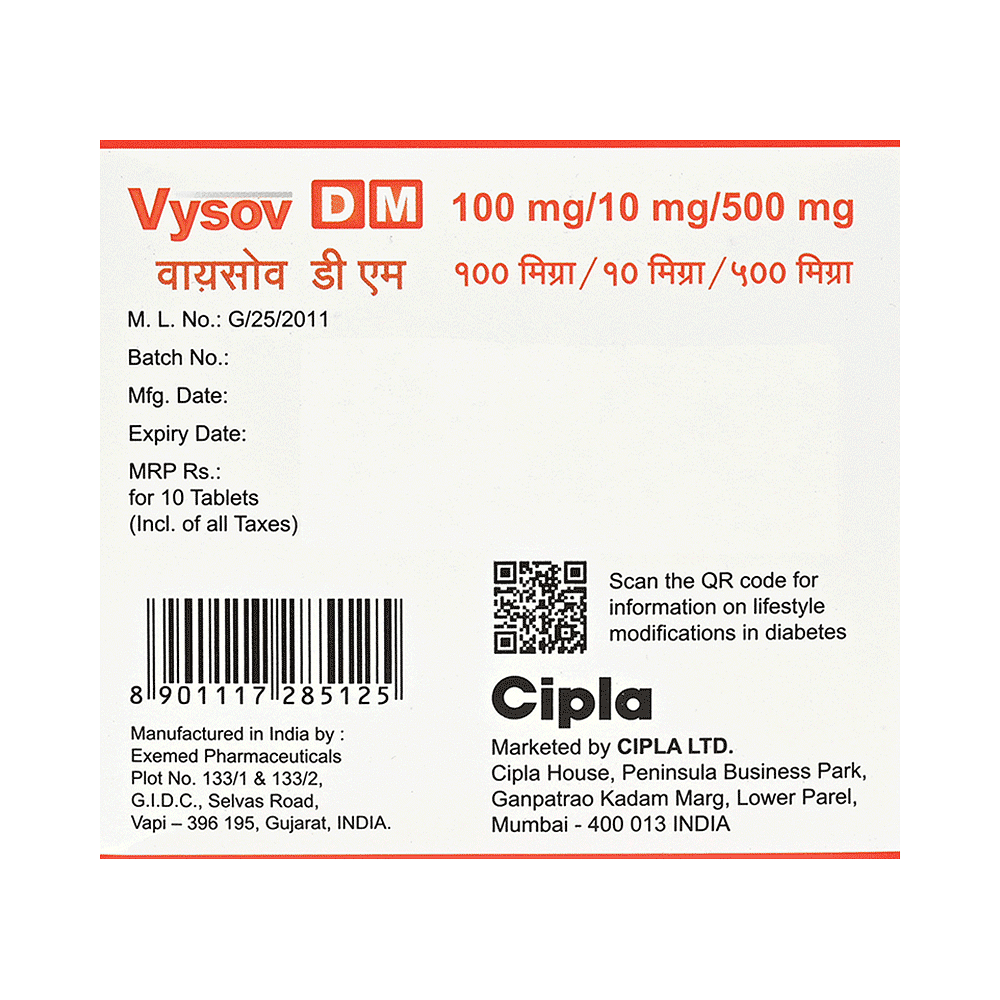
Vysov DM 10mg/500mg/100mg Tablet
Manufacturer
Cipla Ltd
Salt Composition
Dapagliflozin (10mg) + Metformin (500mg) + Vildagliptin (0mg)
Key Information
Short Description
Vysov DM 10mg/500mg/100mg Tablet is a combination medicine that helps control blood sugar levels in adults with type 2 diabetes mellitus.
Dosage Form
Tablet
Introduction
Vysov DM 10mg/500mg/100mg Tablet is best taken with food. The dose will be decided by your doctor and don’t stop taking it unless the doctor advises otherwise. If stopped abruptly, your blood sugar levels may increase and can put you at risk of serious complications like kidney damage and blindness. This medicine is only part of a treatment program that should include a healthy diet, regular exercise, and weight reduction as advised by the doctor.
Directions for Use
Take this medicine in the dose and duration as advised by your doctor. Swallow it as a whole. Do not chew, crush or break it. Vysov DM 10mg/500mg/100mg Tablet is to be taken with food.
How it works
Vysov DM 10mg/500mg/100mg Tablet is a combination of three antidiabetic medicines. Dapagliflozin increases urinary glucose excretion and reduces blood glucose levels. Vildagliptin helps control blood sugar levels by increasing substances (incretins) in the body that make the pancreas release more insulin. It also signals the liver to stop producing sugar (glucose) when there is too much sugar in the blood. Metformin decreases the amount of glucose absorbed from your food and the amount of glucose made by the liver. It also increases the body's response to insulin, a natural substance that controls the amount of glucose in the blood.
Quick Tips
Your doctor will monitor your blood sugar levels regularly when you are taking Vysov DM 10mg/500mg/100mg Tablet. Hypoglycemia (low blood sugar level) may occur when Vysov DM 10mg/500mg/100mg Tablet is taken along with other antidiabetic medicines, or on delaying/skipping a meal. Check your blood sugar levels and have a snack/sugar source for immediate relief. If you get unusually thirsty, pass urine more frequently, and feel tired, let your doctor know. These are the signs of too much sugar in your blood and your dose may need adjusting. Lifestyle changes like a low-fat and salt diet, exercise, not smoking, and cutting down on the amount of alcohol you usually drink may help this medication work better.
Related Medicines
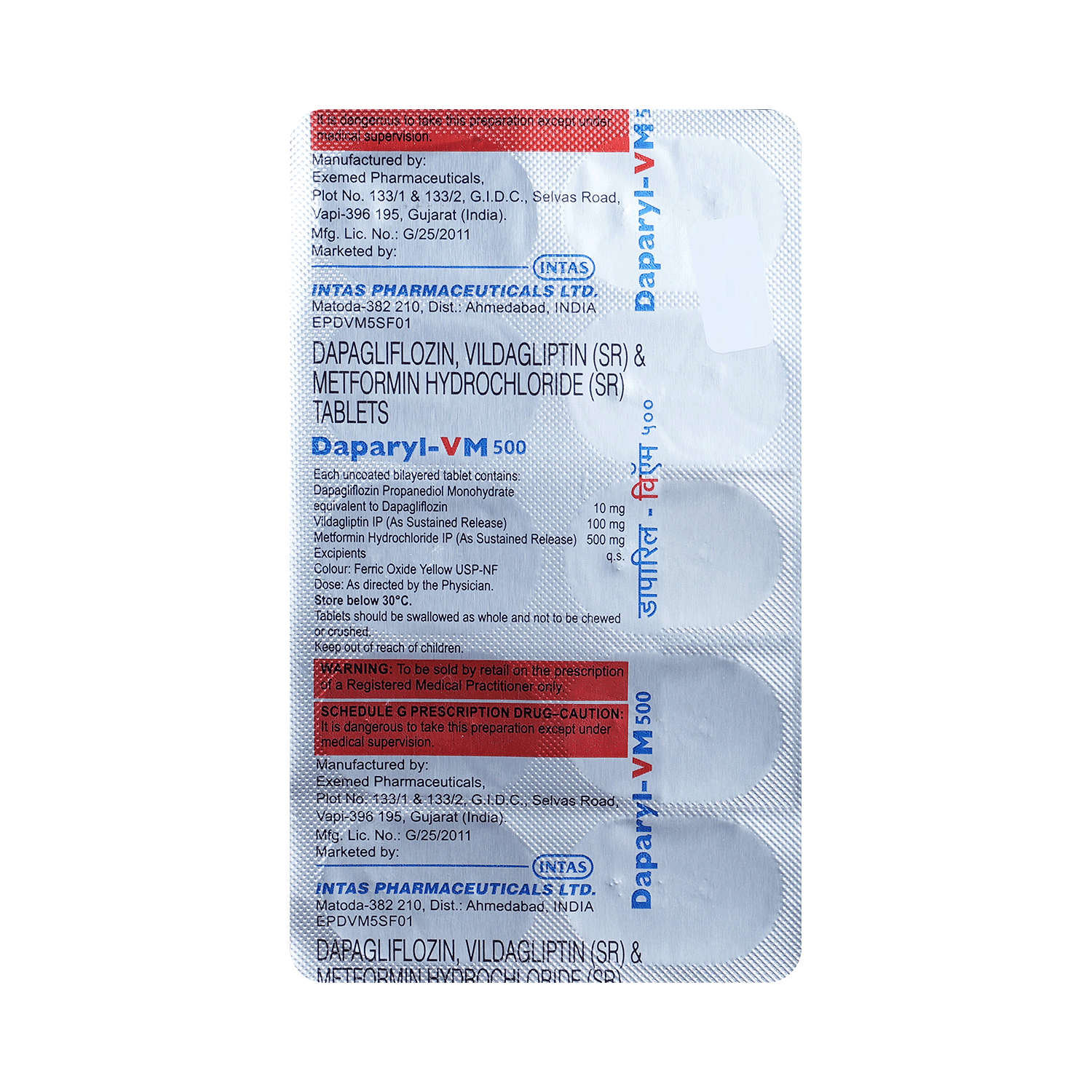
Daparyl-VM 500 Tablet

Gliptagreat DM 10mg/500mg/100mg Tablet
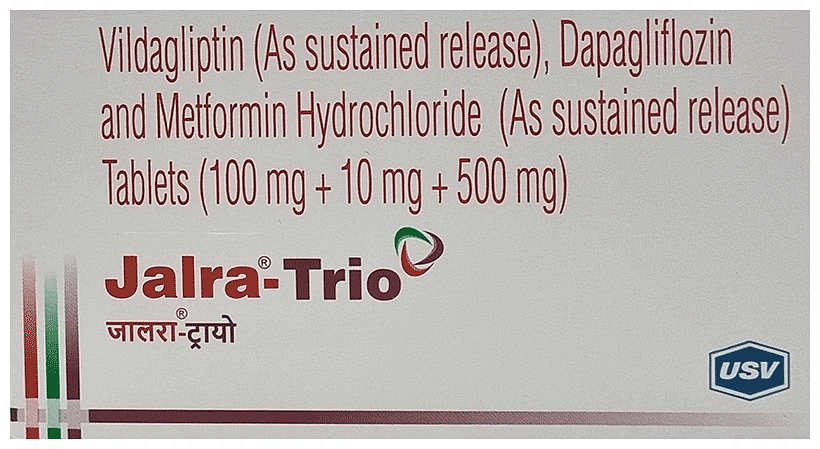
Jalra-Trio Tablet

Zukanorm-DM 10mg/500mg/100mg Tablet
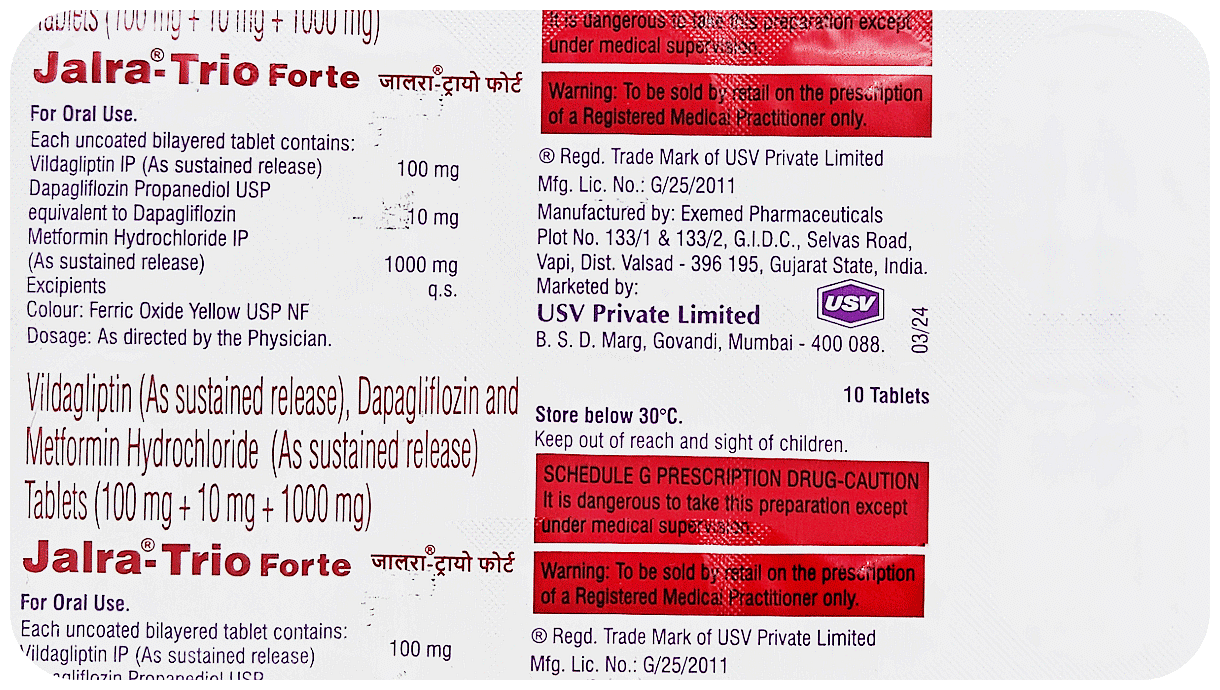
Jalra-Trio Forte Tablet SR
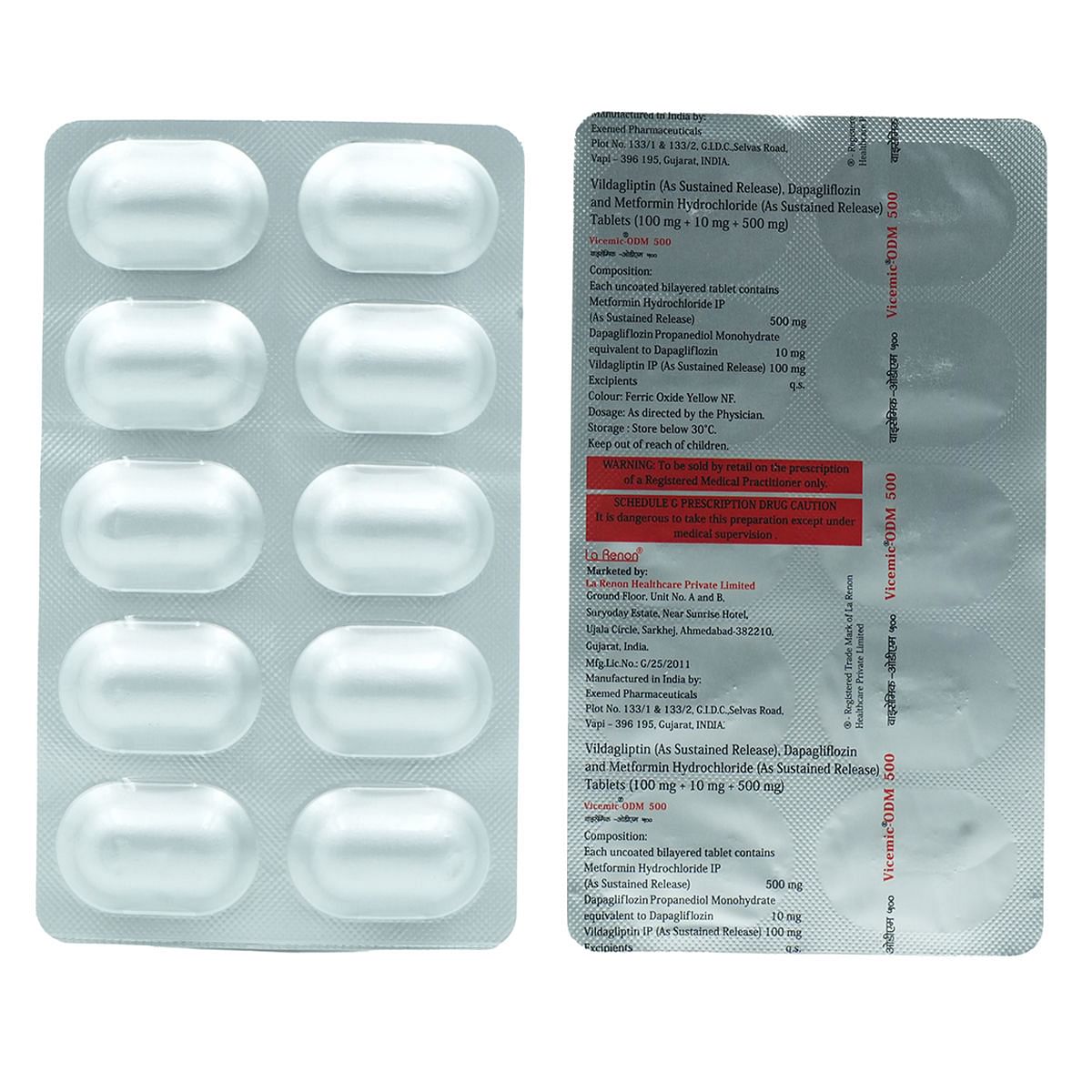
Vicemic ODM Tablet 10mg/500mg/100mg
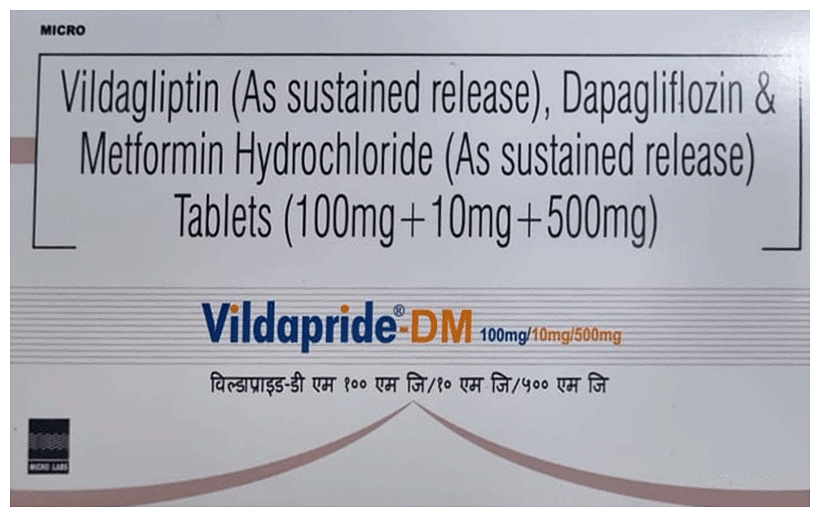
Vildapride DM 10mg/500mg/100mg Tablet

Vildamac Trio 10mg/500mg/100mg Tablet

Vilpower-DM 10mg/500mg/100mg Tablet

Vinglyn Trio 10mg/500mg/100mg Tablet
Frequently asked questions
Is Vysov DM 10mg/500mg/100mg Tablet safe for the kidneys?
Vysov DM 10mg/500mg/100mg Tablet does not directly cause kidney damage. However, if your kidneys are not functioning properly, this medicine can lead to lactic acidosis, a condition characterized by symptoms such as tiredness, weakness, muscle pain, sleepiness, abdominal pain, and breathing problems. If you experience any of these symptoms, seek immediate medical attention.
Can Vysov DM 10mg/500mg/100mg Tablet cause dizziness?
Yes, Vysov DM 10mg/500mg/100mg Tablet can lower your blood sugar level, leading to dizziness when taken with other antidiabetic medicines. If you feel dizzy, sit or lie down until the symptoms pass. Always carry some sugary food or fruit juice with you in case of emergency.
Can this medicine be used to treat type 1 diabetes?
No, Vysov DM 10mg/500mg/100mg Tablet is not used to treat type 1 diabetes or diabetic ketoacidosis (increased ketones in the blood or urine).
Can Vysov DM 10mg/500mg/100mg Tablet cause pancreatitis?
There have been reports of acute pancreatitis due to Vysov DM 10mg/500mg/100mg Tablet. If you experience persistent severe abdominal pain, sometimes radiating to the back, discontinue this medicine and consult your doctor.
What should you not eat while taking Vysov DM 10mg/500mg/100mg Tablet?
To manage blood sugar levels, it is recommended to limit or avoid foods high in saturated and trans fats. Instead, consume healthy fats from fish and nuts, and control carbohydrate intake as it directly affects blood sugar levels.
Is Vysov DM 10mg/500mg/100mg Tablet tablet safe to use?
Yes, Vysov DM 10mg/500mg/100mg Tablet is safe when used as directed by your doctor. However, it may cause some side effects. For best results, this medicine should be used in the correct dose and at the same time each day.
Can I stop taking Vysov DM 10mg/500mg/100mg Tablet tablet?
No, do not stop taking Vysov DM 10mg/500mg/100mg Tablet without consulting your doctor first. Sudden discontinuation of this medicine may worsen your diabetes. Inform your doctor if the symptoms bother you or if no considerable improvement is seen in your condition.
Can people with diabetes have proteins?
Yes, people with diabetes must include protein along with other essential nutrients in their daily diet. Proteins are one of the major energy providers among all essential nutrients. Besides being the building blocks of the human body, proteins break down into glucose to release energy. Unlike carbohydrates, the metabolism of proteins into glucose is much slower.
Are artificial sweeteners good for people with diabetes?
No, artificial sweeteners are not good for people with diabetes. They can cause mild to severe side effects and should be limited or avoided.
Can diabetes cause kidney failure?
Yes, uncontrolled diabetes can cause kidney failure in the long run, leading to a condition called diabetic nephropathy, which is a major cause of kidney failure in patients with diabetes. The best way to prevent damage to the kidneys is by keeping diabetes in check, making dietary changes, monitoring sugar levels regularly, getting routine blood tests done, and taking prescribed medications on time.
Can diabetes be cured?
Although diabetes cannot be cured permanently, with simple lifestyle changes, diet, and medications, one can manage their condition and lead a healthy life.


